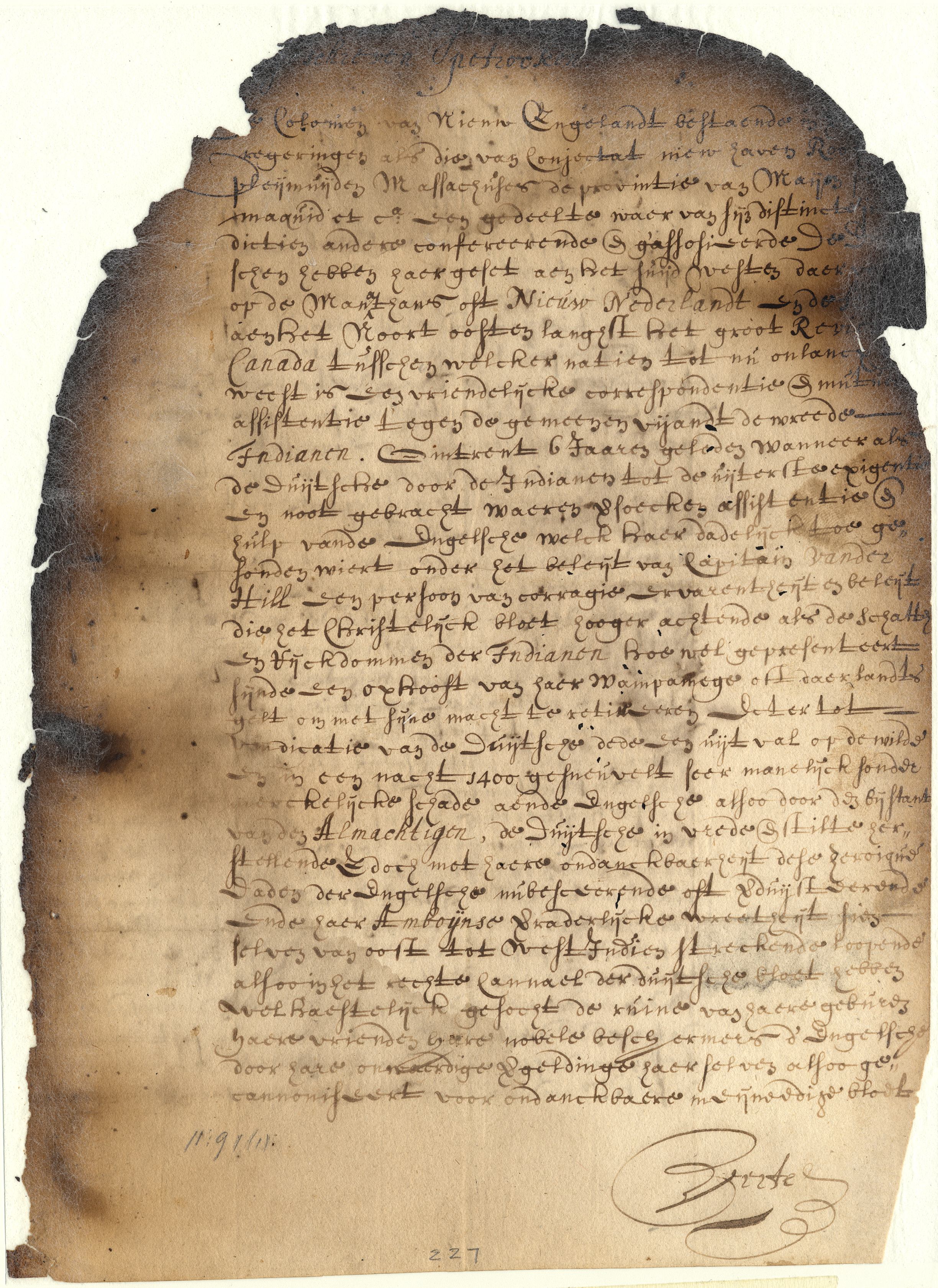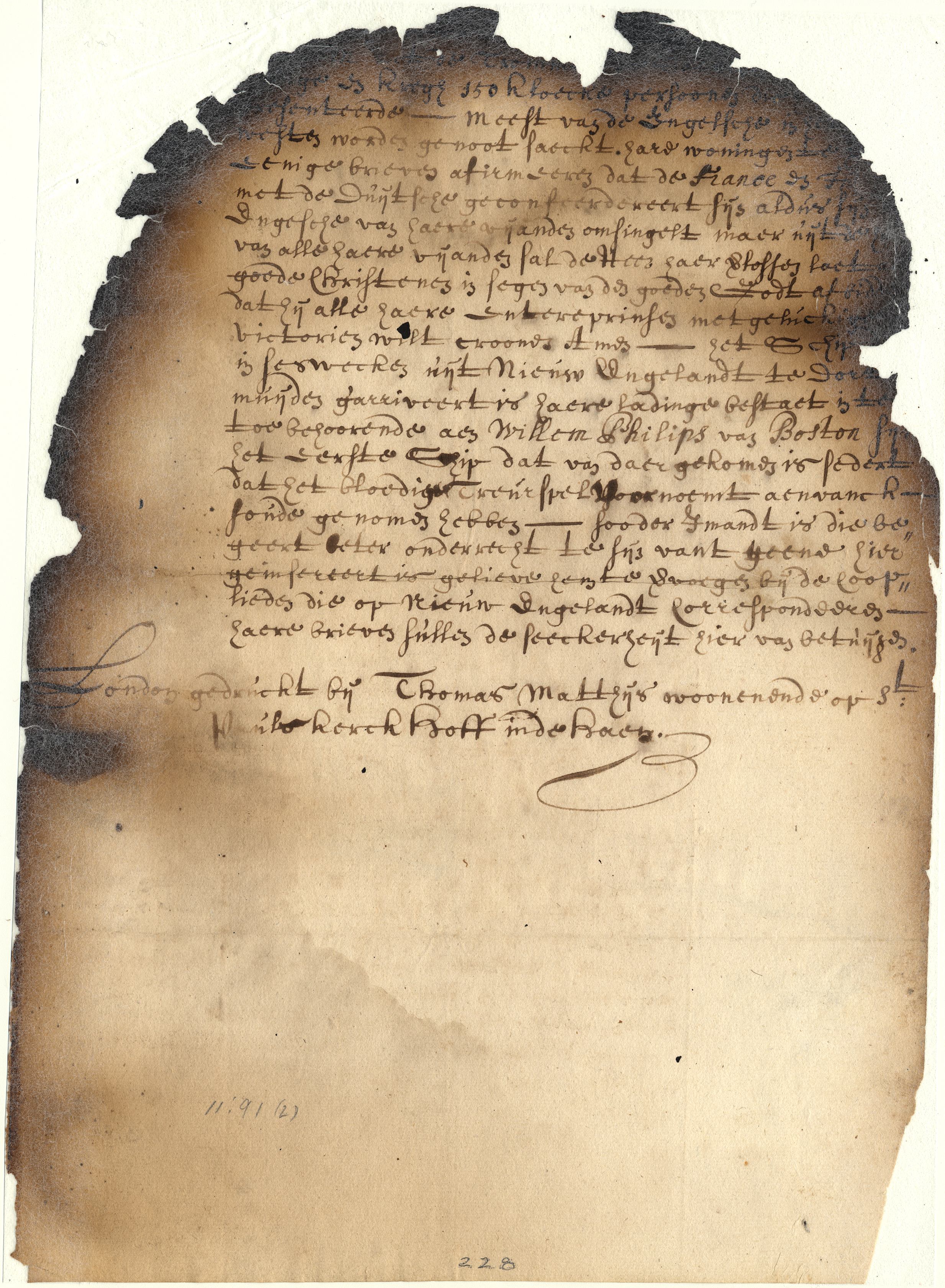The colonies of New England are composed of various governments, such as Connecticut, New Haven, Rhode Island, Plymouth, Massachusetts, the Province of Maine, Pammquody etc. Some of these enjoy their separate jurisdictions, while others are deliberating and associating together.
The Dutch settled to the south of these tracts, on the Manhattans, or New Netherland, while the French took possession of the country to the north-east, all along the Great River of Canada. Between these nations was cultivated, until very lately, an amicable correspondence and reciprocal assistance against our common enemy, the cruel Indians. When about six years past, the Dutch were reduced by the Indians to the most perilous extremities, they solicited the aid and succor of the English, which we sent them without delay, under the command of Captain van der Hill,[1] a person of courage, experience and prudence, who valuing Christian blood higher than the riches and treasures of the Indians, although an offer was made to him of a hogshead of wampum, being their currency, to retreat with his forces, nevertheless hazarded an attack on the Indians in vindication of the Dutch, by which, in one night fourteen hundred savages were killed, without any remarkable loss to the English. By this heroic act, they restored, with the aid of the Almighty, peace and tranquillity to the Dutch.
But the Dutch obscuring or misrepresenting these heroic achievements, by their ingratitude, (while their Amboyna treacherous cruelty extended itself from the East to the West Indies, and pursued thus the straight channel of Dutch blood,) searched ere long to effect the ruin of their neighbors, their friends, their noble protectors, the English; and canonized themselves by their worthless conduct in the rank of ungrateful, perjured, blood-thirsty, cruel men.
[ For they about March, 1653, stirred by presents and promises four of the principal heathen sagamores, great princes in the countries of the Manhattans, ] Narraganses, Pequets, Massachusetts, [ and Pigwoequet, ] some of whom [ were fell, blood-thirsty ] men-the proper instruments to effect such a horrible plan-to make an assault on the English on a Sunday, when the English would be altogether in their meeting houses, and murder and burn all which they could effect. To succeed in this their devilish project, they supplied the Indian dwellings with arms and ammunition which they received from Holland-that fountain of treacheries-a ship load of all sorts of implements adapted to represent The Second Amboyna Tragedy. But God Almighty, who was ever a merciful protector to the English in these quarters, as is evident during the war with the Peqrietten, etc. suscitated, through His infinite goodness, in the fullness of time (before the determined bloody day had arrived) an Indian, who himself was engaged to be one of the bloody executioners, and inspired him to become a savior of our nation by his discovery, when he informed the magistrates of Boston of the bloody intentions of the Dutch and Indians.
Hereupon several merchants were solicited to proceed, with all possible dispatch, to the residence of the Indians, to try what they could discover. On this request, Messrs. Gardner, Huttingson [ Hutchinson ], Hoeper and Severn went thither. The first cabin at which they arrived, was filled with arms and ammunition, although this had always been forbidden to the Indians, and all their muskets were loaded with powder and ball. These arms were carried off by these gentlemen, and brought to Boston, upon which the whole country was armed in its defense, while Capt. Jan Leuret [ Leverett ] and Mr. Davis were commissioned from Boston to New Netherland, and accompanied by a few Indians, who did confess they were hired by the Dutch to become instruments of this unheard of and unparalleled inhumanity. When these gentlemen had returned, and fully convinced that the Dutch were guilty of the aforesaid treachery, men were soon enlisted to oppose the Dutch. Capt. Hawthorne had the drum beat at Salem for volunteers, and obtained one hundred and fifty ablebodied men, who offered their services. A great part of the English in the south-west were compelled to leave their dwellings; and some letters assert that the French and Indians were allied in a confederacy with the Dutch, whereby the English were surrounded by their enemies. But the Lord will deliver them from the hands of all their enemies. Let all good Christians pray God for a blessing on all their enterprises, and crown these with successful victories. Amen.
The vessel that arrived at Dartmouth from New England, in six weeks, is laden with tar, and belongs to William Phillips, of Boston. This is the first ship which arrived thence since the time this bloody tragedy was to be represented. If any individual desires more correct information, he may address himself to those merchants who are trading to New England, whose letters will confirm the certainty of these reports.
London: Printed by Thomas Matthys, residing in St. Paul's Churchyard, at the sign of the cock.
Rights: This translation is provided for education and research purposes, courtesy of the New York State Library Manuscripts and Special Collections, Mutual Cultural Heritage Project. Rights may be reserved. Responsibility for securing permissions to distribute, publish, reproduce or other use rest with the user. For additional information see our Copyright and Use Statement Source:New York State Archives. New York (Colony). Council. Dutch colonial administrative correspondence, 1646-1664. Series A1810-78. Volume 11, document 91, page 1, side 1.




